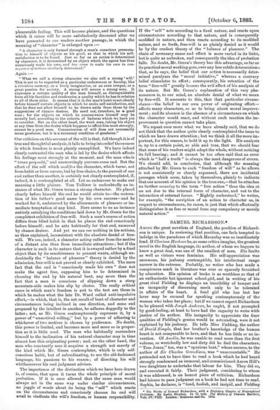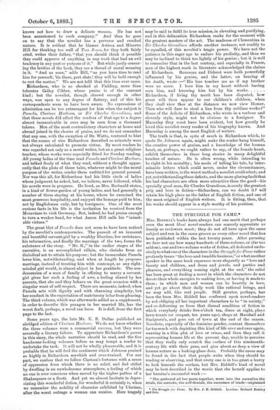SAMUEL RICHARDSON.* AMONG the great novelists of England, the position
of Richard- son is unique. In reviewing that position, one feels tempted to indulge in the paradoxes of which Macaulay was so inordinately fond. If Clarissa Harlowe be, as some critics imagine, the greatest novel in the English language, its author, of whom we happen to. know a great deal, was one of the smallest of men. His faults as well as virtues were feminine. His self-appreciation was enormous, his jealousy contemptible, his intellectual range- narrow in the extreme. Probably, no writer who has made a conspicuous mark in literature was ever so sparsely furnished, by education. His opinion of books is as worthless as that of an enthusiastic but ignorant school-girl, and in writing of his. great rival Fielding he displays an irascibility of temper and an incapacity of discerning merit only to be tolerated in affairs of the heart. A fond girl who has lost her lover may be excused for speaking contemptuously of the woman who takes her place ; but if we cannot expect Richardson to be pleased with Joseph Andrew; he ought, if not prompted by good-feeling, at least to have had the sagacity to write with justice of its author. His incapacity to appreciate the finer qualities of Fielding's genius would be astounding, were it not explained by his jealousy. He tells Miss Fielding, the author of David Simple, that her brother's knowledge of the human heart is not comparable to hers, and that he has little or no in- vention. Of Amelia, he was unable to read more than the first volume, so wretchedly low and dirty did he find the characters. "Tom Jones," too, was a "spurious brat," whose success, to the author of Sir Charles Grandison, was "unaccountable." He pretended not to have time to read a book which he had heard strongly condemned as immoral, and commissioned Aaron Hill's two daughters to undertake that labour for him. They did so, and executed it fairly. Their judgment, considering to whom it was addressed, is an honest piece of criticism. Richardson had leisure to pass judgment on a book he had not time to read. Sophia, he declares, is "fond, foolish, and insipid, and Fielding
• The Works of Samuel Richardson. with a Prefatory Chapter of Biographical Criticism. By Leslie Stephen. In L2 vols. Th. History of Clarissa Barlow,
Vol.. London : Botheran and Co. 1833.
knows not how to draw a delicate woman. lie has not been accustomed to such company." And then he goes on to say that the novelist has a perverse and crooked nature. It is evident that he blames Astram and Minerva Hill for thinking too well of Tons Jones, for they both fairly cried, writes their father, "that you should think it possible they could approve of anything in any work that had an evil tendency in any part or purpose of it." But while justly censur- ing the levities of the book, they see a thread of moral meaning in it. "And as soon," adds Hill, "as you have time to read him for yourself, 'tis there, pert slats! they will be bold enough to rest the matter." We are not told that this time ever came.
Richardson, who is so shocked at Fielding, more than tolerates Colley Cibber, whose praise is of the coarsest kind ; but the novelist, though shrewd enough in other ways, was open to any degree of flattery, and of this his correspondents seem to have been aware. No expressions of admiration can be too extravagant for him when the subject is Pamela, Clarissa Harlow, or Sir Charles Grantlison, and that those novels did affect the readers of that age to a degree almost inconceivable in ours may be seen from a thousand tokens. Men of the most contradictory characters at home and abroad joined in the chorus of praise, and we do not remember that any one, with the exception of Dr. Watts, ventured to hint that the scenes of vice Richardson described so minutely were not always calculated to promote virtue. By most readers he was regarded not only as a moral writer, but as a great religious teacher, whose works were especially fitted for Sunday reading. All young ladies of the time read Pamela and Clarissa Earl owe, and talked freely of what they read, without a thought appar- ently that the plots of those tales, whatever might be the moral purpose of the writer, render them unfitted for general perusal. Nor was this all, for Richardson had his little circle of ladies whose judgment he asked, but, we believe, never followed, while his novels were in progress. He lived, as Mrs. Barbauld states, in a kind of flower-garden of young ladies, and had generally a number of them staying at his house, where he exercised the most generous hospitality, and enjoyed the homage paid to him, not by Englishmen only, but by foreigners. One of the most curious facts in his life is the invitation he received from the Moravians to visit Germany. But, indeed, he had praise enough to turn a weaker head, for what Aaron Hill calls his " inimit- able virtues."
The great blot of Pamela does not seem to have been noticed by the novelist's contemporaries. The pursuit of an innocent and beautiful servant-girl by a wealthy libertine, her resistance, his reformation, and finally the marriage of the two, forms the substance of the story. "Mr. B.," in the earlier stages of the narrative, is an accomplished villain, who shrinks from no diabolical act to attain his purpose ; but the immaculate Pamela loves him, notwithstanding, and when at length he proposes marriage, instead of treating him with contempt, as any right- minded girl would, is almost abject in her gratitude. The con- descension of a man of family in offering to marry a servant. girl gives her such a feeling of awe, a feeling shared by her parents, that she and they behave on the great occasion with a singular want of self-respect. There are moments, indeed, when Pamela acts with dignity and with charming simplicity, but her conduct in the expectation of matrimony is far from pleasing. The third volume, which was afterwards added as a supplement, in order to describe this paragon in her married life, has the worst fault, perhaps, a novel can have. It is dull, from the first page to the last.
Some years ago, the late Mr. E. S. Dallas published an abridged edition of Clarissa Harlowe. We do not know whether the three volumes were a commercial success, but 'they were assuredly a literary failure. To appreciate Richardson's power in this story, the whole narrative should be read, and the five handsome-looking volumes before us may tempt a reader to undertake the task. It will not be wholly pleasurable, and it is probable that he will find the sentiment which Johnson praised so highly in Richardson mawkish and overstrained. For our part, we confess that we follow Clarissa's fortunes with a sense of oppression from which there is no relief, and feel stifled by dwelling in an unwholesome atmosphere, a feeling of which no one is ever conscious when moved by the higher pathos of a Shakespeare or a Scott. And yet we almost hesitate in depre- ciating this wonderful fiction, for wonderful it certainly is, when we remember the nobility of character exhibited by Clarissa, after the worst outrage a woman can receive. Here tragedy may be said to fulfil its true mission, in elevating and purifying, and in this delineation Richardson ranks for the moment with the greatest masters of the art. The madness of Clementine. in Sir Charles Grandison affords another instance, not readily to be equalled, of this novelist's tragic power. We have not the patience in this eager age to endure his prolixity, and thus we may be inclined to think too lightly of his genius ; but it is well to remember that in the last century, and especially in France, men of the highest mark in literature acknowledged the claims of Richardson. Rousseau and Diderot were both powerfully, influenced by his genius, and the latter, on hearing of his death, wrote :—" His loss touches me as if my brother were no more. I bore him in my heart without having seen him, and knowing him but by his works Richardson, if living thy merit has been disputed, how great wilt thou appear to our children's children, when they shall view thee at the distance we now view Homer. Then who will dare to steal a line from thy sublime works ?" Some of the defects of Richardson, who wrote in a verbose and slovenly style, might not be obvious to a foreigner. To Macaulay they must have been evident, but how greatly he loved this novelist every reader of his biography knows. And Macaulay is among the most English of writers.
The truth is that, in spite of much in Richardson which, to quote Dr. Johnson again, might make the reader hang himself, the creative power of genius, and a knowledge of the human heart, or, perhaps, we ought rather to say, of the female heart, exhibit themselves in these long stories in many delightful touches of nature. He is often wrong, while intending to be right in his morality ; his mode of telling his tale, by inter- minable letters which could never, under the circumstances, have been written, is the worst method a novelist could select; and yet, notwithstanding these defects, and the more glaring fault that his bad characters are often more attractive than the good—his specially good man, Sir Charles Grandisou, is surely the greatest prig and bore in fiction—Richardson, can we doubt it? will retain his high place as the father of English fiction, and one of the most original of English writers. It is fitting, then, that his works should appear in a style worthy of his position.



































 Previous page
Previous page